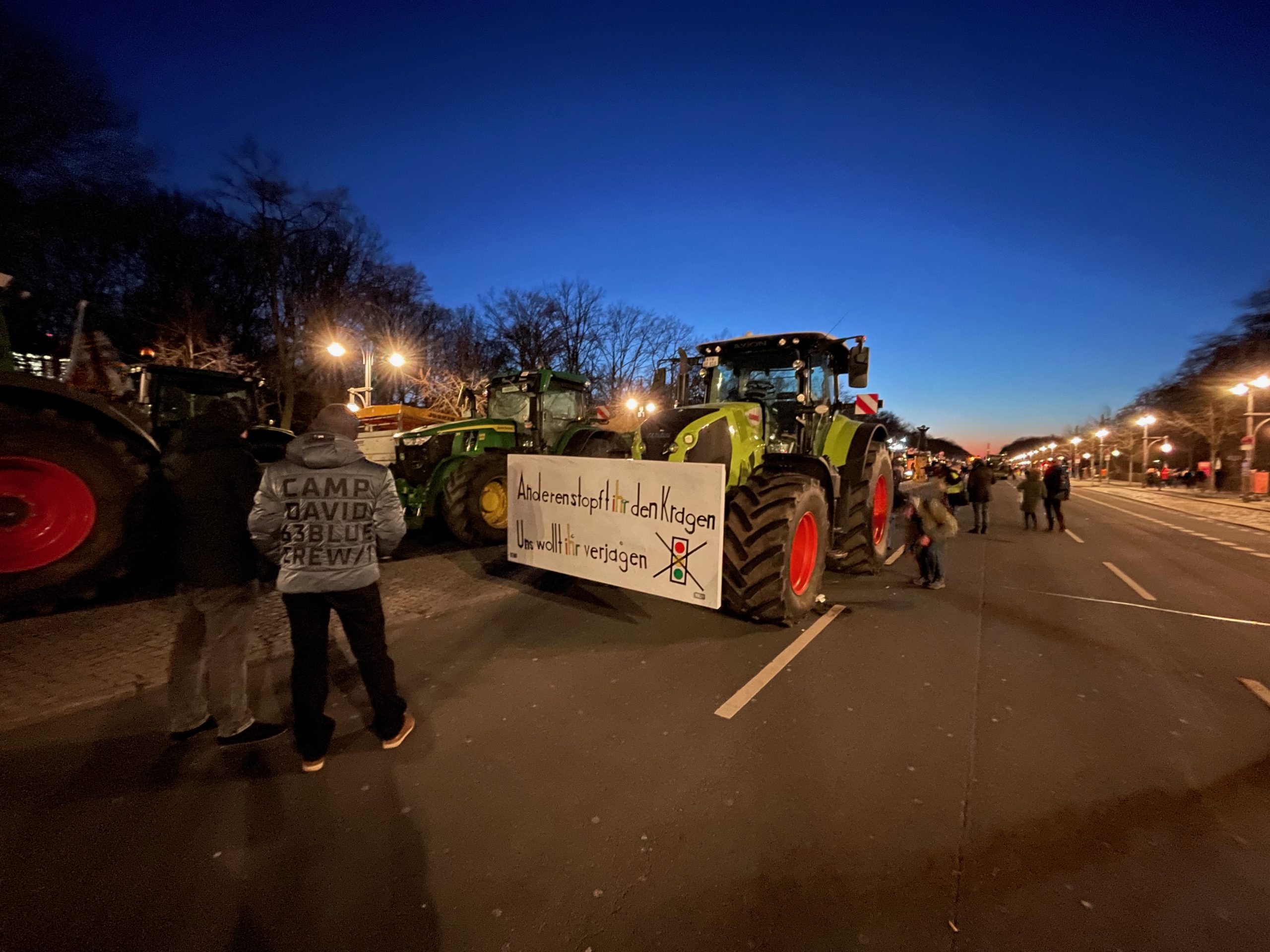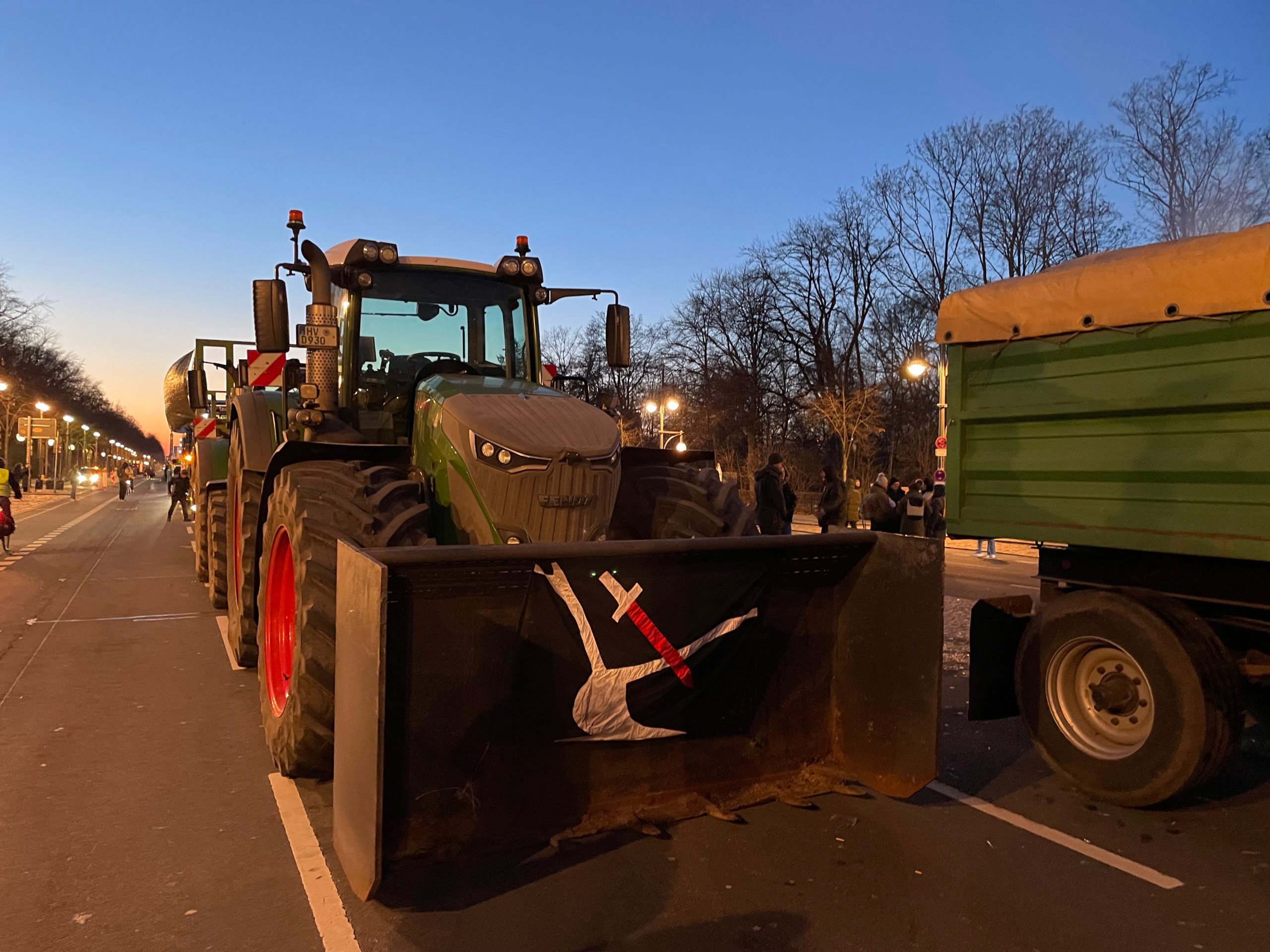Introduction
The locked office sideboard in front of Jost Maurin’s desk looks a bit like a mixture of an outsourced memory and a poison cabinet. Only when Maurin turns the key does it reveal its secret. There are books about the moor and rural life, a “Dictionary of Land and Raw Material Conflicts”, the “Critical Agricultural Report 2025” and everything else he needs as a reference work for his work. But there are also letters that he would perhaps like to forget. For example, the letter with no return address that reached him in December 2023, in which a stranger wished him dead.
Jost Maurin regularly receives hateful messages like this. For years now. They come by letter or as comments online, they are distributed as video messages and once they were even attempted to be delivered to him in person.
Maurin works as a specialist editor for the left-leaning German daily newspaper “taz” in Berlin and writes about agricultural policy, the climate crisis, the food industry, genetic engineering and agriculture. This does not please many people who want to carry on as before: farmers, for example, who are opposed to a climate-friendly restructuring of agriculture. Or right-wingers who fuel farmers’ protests with inflammatory messages and whose machinations Maurin then writes about.
“It’s unpleasant to be insulted like that,” says Maurin. “That’s tough. I don’t like reading that.”
On an afternoon in March, the journalist is sitting at his desk in one of the back corners of the open-plan office in the building of the daily newspaper “taz” in Berlin. His place of work perhaps actually corresponds a little to the clichéd image held up to him by the haters and screamers who have targeted him: a modern editorial building, lots of glass, steel and visible concrete. At first glance, it could be mistaken for an “ivory tower” in the capital’s metropolis – far removed from the problems of farmers. But only at first glance.
Maurin and many other taz editors here have known their subject matter for years. They go out into the countryside, write reports, conduct interviews. It is possible to be familiar with and have expertise in a field without being part of it or affected by it. Or rather, that’s exactly what critical independent journalists do every day.
Before joining taz as a journalist, Maurin worked as an editor at the Reuters news agency and completed his traineeship at the Süddeutsche Zeitung. Many of his texts have received awards, including the “Green Reportage” journalism prize from the Association of German Agricultural Journalists in 2014, 2017 and 2018, a nomination for the “Der Lange Atem” prize in 2013 and the German Reporter:innen Prize in 2022. In 2015, he was “Best Runner-up” at the German Journalism Prize.
Maurin, born in 1974, speaks calmly and thoughtfully. He has clear opinions, which he expresses clearly, but in conversation and also at public events, you can see him repeatedly giving in, pausing and weighing things up: He does not make sweeping judgments about the farmers’ protests and lumps all farmers together. He tries very hard to differentiate.
Not everyone appreciates that. In particular, since the farmers’ protests in Germany and several other European countries escalated in early 2024, some of their anger has been directed at the press. They complained that they were not being given enough coverage, became radicalized and fell prey to an ideology that only saw the established media as supposed mouthpieces of the government or the elitist establishment. For some farmers, the press became a target in an illiberal culture war.
When farmers in Germany and other European countries took to the streets from December 2023 to March 2024, they not only blocked roads and freeways with their tractors, but also repeatedly blocked editorial buildings and distribution centers for German newspapers, some of which could not be delivered. In Germany, Spain and Belgium, there were verbal attacks on reporters and physical violence.
Maurin also calls the verbal attacks “completely out of line” and says: “I find it sad when a political discussion gets out of hand like this. It’s a violation of boundaries and not conducive to democracy.”
Maurin has not yet been physically attacked, but verbally. This has been the case before, but ever since he criticized farmers in January 2024 for their stance of demonstrating for the preservation of environmentally harmful subsidies instead of for a transition to a more climate-friendly agriculture, there has been a hail of hatred. To this day, there is hardly a post by Maurin that does not contain hateful or insulting comments. Since 2023, an openly right-wing farmers’ lobby association has also been trying to legally ban him from speaking out – a legal dispute that is still ongoing.
Is he now more cautious in his wording in the face of all this headwind? “On the contrary,” says Maurin. “I’m not intimidated by that sort of thing.” If he were to resort to self-censorship, people would have achieved their goal. It arouses more of a professional curiosity in him when he has obviously hit a sore spot. “But I always try to weigh things up: What do I need to research and what do I need to report? I just try to get closer to the truth somehow.” He does this because he is convinced that the work is important for society. “That’s the reason why I became a journalist.”
Background and context
The images that dominated many news broadcasts in Germany at the end of 2023 and beginning of 2024 were impressive: convoys of tractors and trucks, highway blockades, demonstrations, dumped piles of manure and burning bales of straw. For weeks, farmers across Germany protested against the SPD, Greens and FDP government and its agricultural policy austerity plans.
It got down to business and quickly became personal: the farmers not only closed off access roads to newspaper houses, blocked roads and lined up on the large boulevard in front of the Brandenburg Gate in Berlin. They also harassed politicians such as the then Green Federal Minister of Economics Robert Habeck on his way back from a private vacation, prevented party conferences, launched shitstorms against critical scientists and radicalized their demands.
While the protests were initially primarily about the federal government’s plans, they soon became a rallying point for dissatisfied – often right-wing – citizens. Slogans such as “If the farmer dies, the country dies” became “Your democracy is the death of our people”. Gallows symbols appeared to express the desired death of the government and posters with the inscription “Kill Özdemir”, i.e. with calls for the murder of the then incumbent Minister of Agriculture Cem Özdemir (Greens).
The farmers gave free rein to an anger that went far beyond agricultural policy demands. They grumbled about bureaucracy and environmental regulations, about the death of farms, about the Green Party and also about what they saw as an excessively lax migration policy. Among the demonstrators were members of the far-right scene and a milieu that became known as the vaccine-sceptical “Querdenken” scene in Germany and had organized against health policy measures during the coronavirus pandemic. The extreme right-wing Alternative for Germany (AfD) party was also involved in the farmers’ protests.
The research portal Correctiv reports on a survey conducted by the University of Heidelberg in cooperation with the Institute for Protest and Movement Research as part of the “Food for Justice” research project at a large farmers’ demonstration in mid-January 2024. The answers of the survey participants had testified to frustration, with most expressing dissatisfaction with democracy in Germany.
The protest of an interest and professional group has since become a right-wing movement critical of the system.
Political background to the farmers’ protests
The protest from mid-December 2023 was triggered by the German government’s austerity plans. Following a ruling by the Federal Constitutional Court, which the circumvention of the debt brakeprohibited , the government was looking for ways out of its financial difficulties. Two of the ideas it agreed on on December 13, 2023 concerned agriculture: subsidies for so-called agricultural diesel and the motor vehicle tax exemption for tractors were to be scrapped.
The first actions by farmers began just one day later. On December 18, 2023, more than 1,500 tractors blocked the road to the Brandenburg Gate. Following further actions, the farmers’ association called for a week of action from January 8, 2024 and a major demonstration in Berlin on January 15, 2024. Even after the government withdrew some of the plans following initial protests, demonstrations continued.
However, not all farmers took part in the demonstrations. Many called for more investment in environmental and climate protection instead of further subsidies.
Editors such as the specialist journalist Jost Maurin from the daily newspaper “taz” were just as skeptical about the farmers’ protest concerns as they were about the existing agricultural subsidies. These are “harmful to the climate” because they reduce the incentive to fossil fuels in agriculturesave. Maurin also referred to the positions of the Federal Environment Agency. In his view, there is an urgent need for environmental policy reform in the sector: agriculture causes many problems, for example by making a significant contribution to the extinction of more and more plant and animal species and polluting groundwater. According to the Federal Environment Agency, 14 percent of German greenhouse gases come from the agricultural sector, including emissions from agricultural soils, explains Maurin. He therefore called, for example, for a reduction in the consumption of animal products and animal husbandry, the development of clean drive systems, less intensive soil cultivation and more economical driving and tractors, and overall investment in more environmentally friendly agriculture.
There had already been protests by farmers in previous years, such as in late 2023/early 2024, for example in 2019, when the German government announced an “agricultural package” that aimed to ban weedkillers and particularly harmful insecticides in most nature conservation areas, primarily in order to curb insect mortality. Even then, farmers across the country protested against the stricter environmental regulations.
Europe-wide networking
The wave of protests by farmers in Germany at the end of 2023 and beginning of 2024 was embedded in Europe-wide demonstrations against the cuts to agricultural subsidies. Farmers in Spain, France, Belgium, Poland and Italy rebelled at the same time.
This led to international networking. Sometimes farmers from the Czech Republic met with their tractors at border crossings with colleagues from Germany, Poland and Slovakia, sometimes Polish farmers blocked the A12 highway at the German-Polish border near Frankfurt (Oder).
Anthony Lee, one of the spokespeople of the German farmers’ protest movement, gave an interview to Dutch influencer Eva Vlaardingerbroek at the beginning of January 2024 on the sidelines of a blockadehighway , in which he explained that they were acting in unison with Dutch, Hungarian and Polish farmers who had joined in. He also hinted that politicians wanted to take away farmers’ land in favor of refugees.
Lee did not respond to a request for comment for this report. Instead, he published a video together with his lawyer in response to the request. In it, Lee said of the statement in the interview: “I think it’s populist to take that out of context.” In the same video, his lawyer advised journalists to be careful and not to give the impression that Lee was a right-wing extremist.
The interviewer Vlaardingerbroek is herself a right-wing populist activist, has appeared several times on shows hosted by far-right Donald Trump supporter and conspiracy mystic Tucker Carlson and was previously involved in the Dutch farmers’ protests. According to an analysis by the Institute for Strategic Dialogue think tankalready exchanged advice on strategies in 2022, German and Dutch farmers had . According to the analysis, local farmers in Schleswig-Holstein met with two of the leaders of the Dutch Farmers Defense Force. During the most recent protests, there were also reports of individual contacts with the British far-right organization Hearts of Oak and other groups.
Organizing in chat groups and right-wing extremist actors
A special feature of the farmers’ protests is the importance of private WhatsApp groups and channels. Alongside the Telegram platform, these played a prominent role in organizing both local and nationwide demonstrations by farmers, as analyzed Institute for Strategic Dialogue in February 2024by experts from the . According to this analysis, local farmers also frequently used Facebook and YouTube to livestream events or call for protests.
Social psychologist Pia Lamberty from the Center for Monitoring, Analysis and Strategy (CeMAS) also told Redaktionsnetzwerk Deutschland in January 2024: “WhatsApp is no longer just a private messenger, but is also increasingly suitable for networking.” The messenger is increasingly becoming a social medium, while retaining its quasi-private character. Whatsapp is the medium that many farmers and private individuals use to network anyway. On Messenger and Telegram, “the conspiracy ideology right-wing extremist milieu is once again showing more activity on the subject of the farmers’ protests”, explained Lamberty.
This is also evident from research carried out by Correctiv’s fact-checking team in January 2024: According to the research, the farmers’ protests had also become a topic in many social media channels and groups that had attracted attention with disinformation about the coronavirus since 2020. There were calls for participation and solidarity with the farmers. “However, the protests not only caught on with coronavirus critics, but also in pro-Russian channels,” it continues.
According to Correctiv, the protesting farmers also included actors who spread conspiracy ideologies and disinformation or were on the fringes of the right. For example, Martin Sellner, an extreme right-wing Austrian activist from the “Identitarian Movement”, spread the assessment via Telegram on December 17, 2023 that the farmers’ protests in Germany had “potential”. The “Free Saxons” also began calling for participation a few days after the start of the protest. The “Free Saxony” party in the German state of Saxony is classified as far-right by the local Office for the Protection of the Constitution.
According to the “Institute for Strategic Dialogue”, “some of the farmers central to the organization of the demonstrations, who played a key role in organizing the demos, were connected to a larger conspiracy ideology and far-right network that extends beyond Germany”. These drew on already familiar far-right and populist narratives – including the “Great Reset” conspiracy and climate change denial. However, according to the analysis by the Institute for Strategic Dialogue, many demonstrators were probably unaware of the dangerous context of the narratives and symbolism used.
One of the controversial symbols that appeared at the farmers’ protests in 2024 was the flag of the so-called “Landvolk” movement from the time of the Weimar Republic. The flag shows a white plow and a red sword on a black background. The taz journalist Jost Maurin reported back in 2020, when farmers used this symbol for their protests in Schleswig-Holstein, that the historical Landvolk movement was accused of being antisemitic and nationalistic and had close ties to National Socialism.
The flag also appeared at farmers’ protests in 2021, which was prominently criticized by the then Federal Minister of Agriculture Julia Klöckner (CDU). According to the Institute for Strategic Dialogue, the Landvolk movement of the 1920s and 1930s and the emblem historically stand for a nationalist “blood and soil” ideology that propagates antisemitic and anti-democratic attitudes. Under the slogan “Fight the Jewish parliamentary system“, the movement also found sympathizers outside its home state of Schleswig-Holstein.
Despite all the criticism, the Landvolk flag was also seen in 2024, for example on tractors demonstrating on the Straße des 17. Juni in front of the Brandenburg Gate in Berlin on January 8, 2024.
Exemplary case: the blockade by Minister Habeck (Greens)
The fact that the 2024 farmers’ protest had links to far-right circles was also demonstrated by an action on January 4, 2024 in Schleswig-Holstein. In Schlüttsiel, a ferry port in North Frisia, up to 30 demonstrators prevented Federal Minister of Economics Robert Habeck (Greens) from leaving a ferry on his way back from a private vacation on Hallig Hooge. Hundreds of people and many farmers with tractors had come to the jetty. According to research by NDR and “Zeit Online”, the protests were started by radical right-wing forces. Among others, the minister’s arrival had been spread on the internet by a man who is said to have used the Landvolk flag at at least one earlier protest and is a member of the “Land schafft Verbindung” (LSV) association in Schleswig-Holstein and Hamburg. A spokesperson for the association later told NDR that he had “not seen any tendencies towards extreme political tendencies” in the man.
Other channels had also called for a protest against Economics Minister Habeck at the ferry terminal that day, including the Telegram channel “Freie Schleswig-Holsteiner”. The channel had almost 6,000 subscribers at the beginning of 2024. The State Office for the Protection of the Constitution in Schleswig-Holstein mentioned the Telegram channel in its report for 2022 under the category “Delegitimization of the state relevant to the protection of the constitution”, which was newly created after the coronavirus protests.
The “Freie Schleswig-Holsteiner” channel showed the radicalization of the coronavirus protest scene towards unfiltered right-wing extremist ideology – as well as jumping on current protest movements such as those of farmers and peasants. The channel actually disseminated content from Martin Sellner, a leader of the far-right Identitarian Movement, videos from right-wing US influencer Tucker Carlson or contributions on the AfD that criticize its course as insufficiently radical. However, some of the messages also make reference to the farmers’ protests. Posts from the “Landvolk schafft Verbindung” channel were shared here as early as 2022, and in March 2023 the success of the Dutch Farmers’ Party was celebrated as a “landslide victory”.
Scientist also caught in the crossfire
Despite examples such as the one at the ferry terminal in Schleswig-Holstein, Janna Luisa Pieper, an agricultural sociologist at the University of Göttingen, tried to take a differentiated view of the movement. Farmers of all stripes had demonstrated, from the big agricultural lobby to small associations, Pieper said in an interview with Norddeutscher Rundfunk in mid-January 2024. “You have to make a clear distinction and not make the mistake of classifying the whole movement as anti-democratic,” said Pieper. There was a demarcation to the right and to the conspiracy milieu, but this was delayed and the large associations sometimes differentiated themselves more and sometimes less sharply.
As an explanation for the proximity or openness of demonstration participants to right-wing ideology, Pieper pointed out in the interview with NDR that the farmers were concerned with recognition but also with existential fears. “Existential fears can trigger rigid defensive reactions in the form of constructions of enemy images, conspiracy myths and hatred. The vehement criticism of ‘the traffic lights’ and the ‘Berlin elites’ in the form of the supposedly ‘left-green-soiled’ media, consumers, ‘politics’ and ‘the Greens’ takes up a typical right-wing populist narrative: They operate with simple enemy stereotypes and simplistic explanations for complex problems, stylize themselves as victims and engage in blanket mobilization against ‘those at the top’.”
However, the differentiated analysis did not protect Pieper from becoming the target of massive hostility because of her public interview statements. Among others, the lobbying firm “Freie Bauern”, which is also taking legal action against taz editor Jost Maurin, tried to Pieper for her statements sue – and lost.
Freie Bauern” did not respond to a request for comment for this report.
Hostility towards the press as a recurring motif of the farmers’ protests
Attacks against independent voices from the scientific community, such as agricultural sociologist Janna Luisa Pieper, as well as against critical journalists became more frequent during the 2024 farmers’ protests. They were mostly verbal, but sometimes became physically violent.
“Hostility towards the press was quite prominent during the farmers’ protests,” says taz journalist Maurin. “It was and is a constant narrative that says: ‘The media are against us’.” According to the narrative, journalists in Germany would allegedly vote predominantly for the social democratic SPD and the ecologically-minded Greens, would only ever portray farmers as “poisonous” and would blame them for everything: climate change, groundwater contamination and much more.
The numerous blockades of editorial offices, public broadcasters and, above all, press distribution centers by farmers, as a result of which some newspapers could only be delivered with a delay or not at all, were striking during this time. It is a form of protest that was also taken up by climate activists in mid-2025.
In mid-February 2024, the newspaper “Die Welt” a farmer , who explainedquoted on the farmers’ actions: “If newspapers report incorrectly, it is perfectly legitimate to block deliveries.” The federal government is not listening to the farmers, the man continued. “And if this continues, then we will have to take a tougher stance until everyone understands that we are not satisfied with this agricultural policy.” On the other hand, the German Farmers’ Association (DBV) also criticized the actions against publishers and public broadcasters to the newspaper. “In our view, demonstrations and other protest actions in front of media houses are the wrong instruments.”
In mid-February 2024, the German Journalists’ Association stated that the blockades of media companies were continuing. “The farmers’ protests are obviously being misused by lateral thinkers and other enemies of the media for their dubious purposes.” The farmers’ protests are a welcome opportunity for media opponents to go on the rampage. It is absolutely legitimate to criticize reporting and to want to discuss it with journalists. But the blockades are an organized refusal to talk.
The Bavarian Journalists’ Association (BJV) also had declared: “Wanting to stop or delay the delivery of a newspaper is an attack on the freedom of the press.” This would create a threatening backdrop and attempt to influence reporting.
Right-wing extremists and pro-Russian broadcasters were welcome
The farmers’ anger did not affect all media representatives equally. According to research by Correctiv, the German branch of the Russian propaganda channel “Russia Today” – which is actually blocked in the EU due to sanctions, but still available is – reported on the farmers’ protests in a live ticker and in reports. The same applied to the extreme right-wing Austrian channel Auf1. As Correctiv investigated, the broadcaster stated that it had been on the road nationwide with ten teams on the farmers’ big protest day on January 8, 2024 and had reported in a special broadcast. The Compact magazine, which as right-wing extremist by the Office for the Protection of the Constitution, is classified also reported in detail.
Chronology of anti-press actions
When it comes to the mood at the farmers’ protests and attitudes towards the press, it helps to take a look at a database from the European Center for Press and Media Freedom, which documents anti-press incidents in Europe as part of the “Media Freedom Rapid Response” project.
For the year 2024, the database lists 24 entries in connection with the farmers’ protests alone, ranging from physical attacks on reporters to blockades of editorial offices and newspaper distribution centers. There were incidents in Spain, France, Belgium and Germany, which is the country most affected with 14 incidents.
Farmers’ protests in 2024: personal attacks and blockades of editorial offices and press logistics
In 2024, there were also anti-press attacks beyond blockades or mass demonstrations with tractor-trailers, which indicated very early on in the year that journalists could become targets.
One example of this is an incident in Wetzlar in Hesse on January 14, 2024 during a demonstration. According to press reports, this took place with the support of politicians from the right-wing AfD and people from the vaccine-sceptic “lateral thinking” milieu that had emerged during the coronavirus pandemic. When freelance journalist Joachim Schäfer wanted to interview a farmer on camera that day, a local CDU politician interrupted the interview and demanded a press pass. Schäfer’s camera was shut and an activist from the “Querdenken” milieu grabbed the reporter by the jacket to “hand him over” to the police. A video documents the incident.
Just ten days later, people from the spectrum of farmers’ protests began to take anti-press actions to a structural level.
On January 25, 2024 500 people blocked the state broadcasting center of the public broadcaster MDR in Erfurt: The demonstrators came with around 300 vehicles, including trucks and tractors, and protested against the lying press: “From editor to speaker – all criminals” was written on their banners against the alleged “media agitation”. Some MDR employees did not dare leave the premises because of the action.
A few days later, on February 3, 2024, shortly after midnight, 70 to 100 demonstrators a press distribution center in Hamburg with vans and cars blocked. The aim was apparently to prevent the delivery of newspapers, as reported by SPIEGEL, which was itself affected. Some regional deliveries were delayed. A reporter from the news portal t-online reported that the reason for the demonstration was the protesters’ dissatisfaction with the press coverage of the farmers’ protests in the port of Hamburg.
The action was the first that year to specifically target press logistics and probably acted as a kind of “blueprint”. In the days that followed, farmers all over Germany protested in front of editorial buildings and, above all, press distribution centers.
On February 5, 2024 around 400 people with 175 tractors and 30 cars blocked the printing and publishing house of the Allgäuer Zeitung in Kempten, Bavaria. The Bavarian Journalists’ Association (BJV) criticized: “Wanting to stop or delay the delivery of a newspaper is an attack on the freedom of the press.” On the morning of the same day, farmers and supporters had already demonstrated in front of the state broadcasting center of the public broadcaster Norddeutscher Rundfunk (NDR) in Hanover, Lower Saxony. They arrived with around 30 vehicles, including numerous tractors, and demanded that more coverage be given to their protests.
Also dissatisfied with the reporting, around 50 farmers blocked the printing plant of the “Nordsee-Zeitung” in Bremerhaven with vehicles for two hours and also dumped manure. According to media reports, their aim was on February 8, 2024 to prevent the newspaper from being delivered.
One day later, on February 9, 2024, more than 40 tractors, articulated lorries and cars themselves in front of the Springer printing plant in Ahrensburg near Hamburg for almost six hours positioned. Newspapers such as the Hamburger Abendblatt, Bild, Welt, FAZ and Süddeutsche Zeitung, which are also distributed from there, left the premises late.
Just under a week later, on February 15, 2024, the private television station NTV reported an incident in Seligenthal in Thuringia. According to the report, demonstrations were held against the government’s agricultural policy during a visit by Economics Minister Robert Habeck (Greens). According to NTV, a mob of around 50 people prevented journalists from reporting on the event: “They threatened the reporters and insulted them.”
Two days later, on February 17, 2024, 150 demonstrators with tractors, trucks, vans and cars blocked the road in front of the Norddeutscher Rundfunk (NDR) television station in Hamburg-Lokstedt for a full 24 hours. “We also want to ensure that the reporting runs as it should,” told one of the participants to the local police.
In the German state of Brandenburg, unknown persons then piled bales of straw in front of the editorial building of the newspaper Der Prignitzer in Wittenberge on February 26, 2024.
One day later, on February 27, 2024, there was an incident in Lübben in Brandenburg, as reported by reporter Julias Geiler for the Tagesspiegel: the “Unser Lübben” initiative, which was founded in 2023 to protest against a planned refugee shelter, demonstrated there. Their clear enemy that evening was the media. Two local reporters from the Lausitzer Rundschau newspaper were mentioned by name, pilloried, pushed away and pelted with eggs. One of the accusations was that the reporters and their newspaper were not covering the farmers’ protests properly.
On February 29, 2024 the Südwest printing center in Villingen-Schwenningen, where the Schwarzwälder Bote is printed, was hit. 100 demonstrators blocked the site with tractors and trucks to prevent the delivery of newspapers due to displeasure over the coverage of the agricultural protest. An emergency access road was blocked by a pile of manure several cubic meters high.
Anti-press actions by farmers in other EU countries too
For the German farmers, one of the reasons was the German coalition government’s plan to cut subsidies for agricultural diesel. However, farmers in other countries are also protesting against agricultural policy. And here, too, farmers were often hostile towards journalists.
In Spain, for example. On February 10, 2024 protesters in Madrid attacked a television crew from the public broadcaster RTVE, who on the wanted to report live in the Spanish capitalprotest of farmers and transportation professionals . The journalists were insulted, their camera was shut and they were spat at.
Four days later, on February 14, 2024 the Professional Council of Catalan public broadcaster TV3 a statement on attacks published suffered by its journalists while covering the farmers’ protests. According to the statement, they were insulted and threatened, their cars were smeared with graffiti and tires were punctured.
And on February 21, 2024 farmers at a demonstration Madrid smashed the lens of a camera belonging to the La Sexta channel and tried to snatch the microphone from a reporterin . “You could hear cries of ‘manipulative Spanish press’ and mentioning our channel directly”, she later explained.
In the middle of the next month, on March 12, 2024 a team from the public broadcaster RTVE was hit again in Toledo. While the journalists were trying to report on the local farmers’ protest, they were harassed and insulted. The demonstrators shouted the sexist insults “slut” and “bitch” at one reporter. The team had to seek protection from the police. Two photojournalists from the agencies EFE and ENCLM, who wanted to document the events, . They were insulted and pelted with plastic bottles suffered a similar fate.
In Brussels, the physical attacks on journalists reached their sad climax that month. On March 27, 2024, farmers demonstrated in the Belgian capital against the EU’s agricultural policy. A group of journalists, including a reporter from the Flemish-Brussels media BRUZZ as well as reporters from the public broadcaster VRT NWS and the private broadcaster V. They were attacked with fireworks, had their cameras snatched from their hands and had their photos deleted. Objects were thrown at them and they were punched in the face.
What became apparent during the blockades and attacks on the press in Germany and Europe during the farmers’ protests was that in many places, the demonstrations overlapped with right-wing extremist groups and people from the vaccine-sceptic “lateral thinker” milieu. The press rapidly established itself as a tangible enemy right from the start of the wave of protests, with public broadcasters across Europe being the most frequent target of attacks.
While journalists’ associations and trade unions sharply criticized the attempts to prevent reporting, even by blocking press logistics, as attacks on press freedom, farmers’ associations and lobby groups found it difficult to condemn them. They often criticized the violence, but maintained an ambivalent relationship and showed understanding for the “frustration of the farmers”.
Jost Maurin – a journalist becomes the target of right-wing farmers
In the mood against the press described above, it was enough for many farmers if newspapers and TV stations did not report enough about their protests in their eyes. It became much worse when journalists dared to criticize them or even question their concerns with professional objections.
Jost Maurin did just that. He has been reporting on agriculture and agricultural policy as a specialist editor for the daily newspaper “taz” for years, making him a double hate object for many farmers. Maurin is familiar with the subject matter, takes a pro-environmental and climate-protection stance and also works for a left-leaning newspaper that many accuse of being close to the already hated Green Party.
Maurin therefore became the enemy. To this day, he is regularly confronted with hate messages. But if you ask him when he started experiencing hostility, it doesn’t take long for him to bring up examples that date back long before the farmers’ protests of 2024, some of which were years ago. Maurin has not forgotten them. They are not listed in the database of the European Center for Press and Media Freedom. But Maurin has archived some of them himself.
“I assume that the authors of such inflammatory comments are probably not the typical or regular taz readers,” says Maurin. He estimates that the insults come from people who have shared his articles in their WhatsApp groups, where many farmers network. “Someone posts it there and then it gets passed on,” he says. You can also see from the evaluations on the taz.de website that in these cases the clicks don’t traditionally come to the articles via the homepage, explains Maurin.
However, he suspects that it is actually primarily farmers who write him hate messages and not classic right-wing extremists who have jumped on the protest bandwagon. He sees this, for example, when he clicks on the profiles of those who insult him on Facebook. Many of those who follow him on his social media channels are farmers, says Maurin.
2017 – Death wishes for the first time
One of the first threats Maurin remembers was in 2017, when he reported on the discussions between hunters and nature conservation organizations about the return of the wolf in Germany. The wolf is strictly protected in Germany. After the animals became extinct in Germany and Western Europe, they gradually re-established themselves following the fall of the physical border barrier between East and West Germany. This led to conflicts between farmers on the one hand, whose livestock had been killed by wolves, and animal rights activists on the other, who were happy to see the wolf reintroduced in the interests of greater biodiversity.
In mid-May 2017, Maurin published a report on this debate in the taz newspaper, in which he presented the position of the state hunters’ association in Lower Saxony, which advocated the shooting of individual animals in exceptional cases. Maurin mentioned in the report that the number of livestock killed by wolves was increasing and that people had also been killed by wolves in the past.
Maurin also regularly posts his texts on Facebook.
At midnight on June 2, 2017, Maurin received a personal message via Facebook Messenger. In it, the sender Benjamin S., who was not afraid to use his full name in the message, insulted Maurin as a “retard” and accused him of “inciting hatred against the wolf”. The sender also wrote a sentence that can certainly be understood as a threat, perhaps even a death threat: “You moron should be kept in check with a gun or at least removed from your fucking left-wing wank sheet”. In a second message, the sender added: “I’ll be happy to tell you that personally in your face, you asshole!”
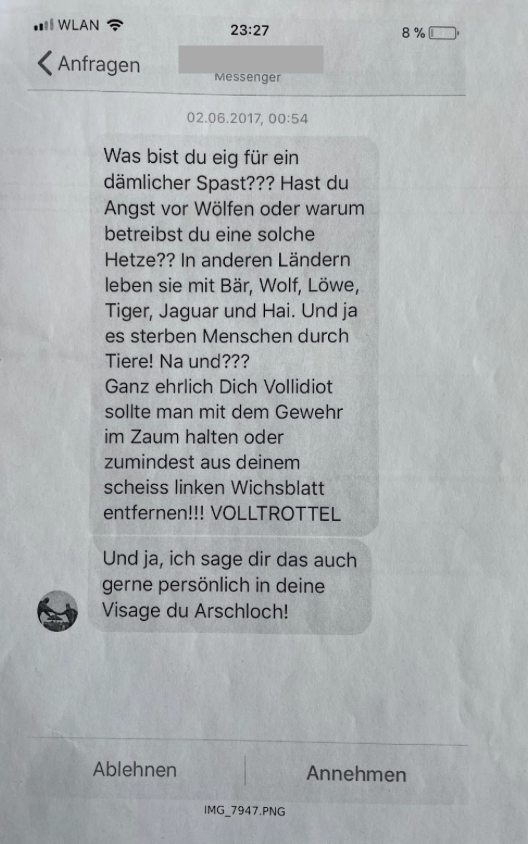
Maurin reported the incident to the police. He himself no longer remembers what became of the complaint.
Interestingly, the first threat of violence that Maurin remembers probably did not come from the farmers, most of whom were also complaining about the return of the wolf, but presumably from an animal rights activist. The fact that he insulted the taz as a “shitty left-wing wank sheet” also suggests that he probably doesn’t see himself as being on the political left.
It should be noted that in Germany, the issue of animal and environmental protection is not always associated with a politically left-wing view. Conservative and even right-wing extremist circles sometimes also hold positions that advocate the “protection of the homeland” and, for example, propagate ethnic ideas of a simple country life in supposed harmony with natureanti-modern, . The wolf is ascribed an exaggerated mythological significance in the far-right scenein particular .
2019 – When the farmers came by in person
More than two years later, however, it was the farmers who were annoyed by Maurin’s texts. Although there were no explicit threats of violence, there was personal intimidation.
This went so far that on November 26, 2019, a group of farmers made their way to the new taz editorial building at Friedrichstraße 21 in Berlin to express their anger at Maurin.
On that Tuesday, a farmers’ demonstration took place in Berlin, which was directed against the then impending “agricultural package” of the German government consisting of the CDU and SPD. The amendment was intended to introduce new regulations to protect water and biodiversity, for example by banning weedkillers and particularly harmful insecticides in most nature reserves in order to curb insect mortality. Agricultural subsidies should also be changed in order to finance more environmental projects by farmers and the spreading of liquid manure should be restricted.
Farmers had already demonstrated against the planned “agricultural package” in October 2019. Maurin accompanied the protest with several critical texts. On , he explained November 25, 2019 in a commentary that the farmers were demonstrating against their own interests. The commentary received 105 reader comments on the taz website alone, to which Maurin often responded.
At the end of October 2019, and again on the day of the demonstration on November 26, 2019, Maurin published an article entitled “The lies of the farmer whisperers” about the right-wing structures calling for the demonstrations. These were “Land schafft Verbindung” (Land creates connection). This was officially an independent movement that had emerged through mobilization on the Internet. “In fact, sub-organizations of the German Farmers’ Association helped steer it from the very beginning,” Maurin wrote. The Schleswig-Holstein Farmers’ Association influenced the movement not only through the cooperation of officials, but also through propaganda. And: the association regularly publishes false or misleading information on its Facebook and Instagram pages. The content of the posts is passed on by farmers throughout Germany. Maurin accused the association of disinformation. Posts in which the association reproduced arguments from deniers of man-made climate change were particularly conspicuous. According to Maurin, the association also played down the contribution of agriculture to the emission of greenhouse gases.
In the Bundestag, only the particularly right-wing AfD party would support all of the farmers’ demands. Maurin also accused the “Land schafft Verbindung” association of having “no time” for questions from the taz, but for an hour-long shoot with the Russian propaganda channel Russia Today, which had repeatedly attracted attention with blatantly false reports.
According to Maurin, the main person speaker Sönke Hbehind the social media pages of the Schleswig-Holstein Farmers’ Association was its ., who is also involved with the CDU grassroots. On November 15, 2019, he posted xenophobic sentences on his private Facebook page that placed Islamic migrants under general suspicion. At the time, H. had left a request for comment from taz unanswered by the editorial deadline.
However, the protesting farmers were apparently particularly displeased by an article by Maurin, which reported on several actions by the farmers in which they had intimidated journalists. On November 14, 2019, Maurin the title “With manure on the doorstep” wrote about how farmers had harassed a newspaper journalist and a local Green Party politician in Lower Saxony by protesting outside their private homes under. In addition, the farmers had demanded petition that an editor they did not like be removed from the agricultural editorial department of Bayerischer Rundfunk.
On Sunday morning, November 10, 2019, around 20 farmers appeared unannounced in front of the private home of an editor of the Braunschweiger Zeitung newspaper. They had set up benches and blocked his way to his Sunday shift. They also wanted to give him a wheelbarrow full of stinking manure, allegedly as a satirical negative prize. According to a report in the Braunschweiger Zeitung, the farmers are said to have stated on a flyer that the editor had dealt with the farmers’ situation in a “polemical and technically very inadequate” manner. At the time, the newspaper firmly rejected the accusation and explained that the colleague’s family had increasingly perceived the situation as threatening, like a siege. “We will not tolerate the intrusion into the private life of a journalist. A line has been crossed here that must be defended.”
On October 22, 2019, it had already become clear how some farmers react to criticism. On that day, a petition was launched on the “Change.org” platform, which was directed at the “Media Council” of the public broadcaster “Bayerischer Rundfunk” and called for an agricultural editor to be removed from the editorial team. She had previously given an expert interview in a news program. The petition received over 5,000 signatures. A spokesperson for the broadcaster told taz at the time that the demand to remove the journalist was “incompatible with freedom of the press”.
A group of farmers from the region around Braunschweig in Lower Saxony, which calls itself “3vor12 – Bauern in Not(3vor12 – farmers in need) ” and claims to the “Land schafft Verbindung” (land creates connection) movement be close to , was behind the house visits with the manure cart. In 2019, the group reported on its actions on its own Facebook page with pictures, blog posts and videos.
On November 14, 2019, taz editor Maurin reported on all these incidents of intimidation attempts by farmers against journalists and politicians. It was precisely this critical report that prompted the farmers from Braunschweig from “3vor12” to visit Maurin at his workplace.
On November 26, 2019, a group of around 20 men, women and children drove up to the taz. There was at least one tractor, wooden benches and the “Golden Dung Cart”. On the same day, the farmers themselves reported on this action on Facebook and also uploaded a video. The text reads: “Today we wanted to thank Mr. Maurin for his article ‘Farmers intimidate journalists’ with our Golden Dung Cart (GMk), but the agricultural editor of the taz took a leave of absence as a precaution when he heard that real agriculture was coming to Berlin.”
In their own account, the farmers emphasized that they had been peaceful and open to dialogue. However, they had not previously answered questions from taz editor Maurin.
According to taz editors who were present at the action at the time, the atmosphere on site was indeed relaxed. This can also be seen in a video that the farmers themselves filmed and published of the action at the time. It shows a taz editor accepting the “Golden Dung Cart” in a friendly manner and holding the door to the entrance area of the editorial building open for a farmer.
In a similarly open-minded tone, a text was published a day later in the taz on its own behalf, explaining the action in front of the editorial building.
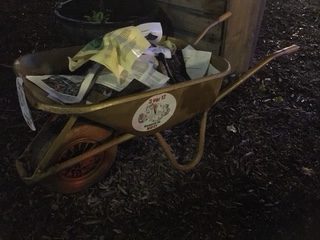
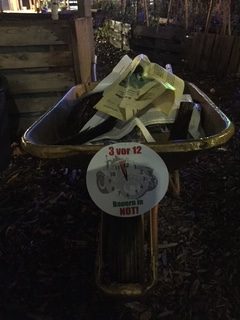
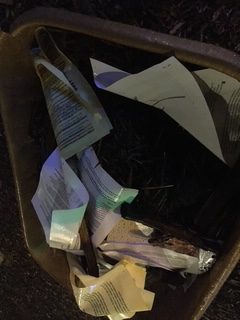
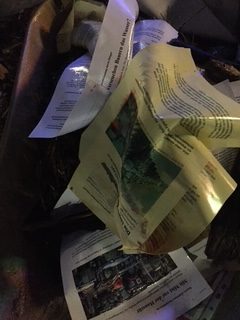
Other media also reported on this and other blockade actions by the farmers in a more sympathetic tone – including the media magazine ZAPP of the public broadcaster NDR, which even accompanied the farmers with a film crew during the preparations for the muck cart and whose report began with the fact that the access road to the broadcasting site had also been blocked by several tractors of the protesting farmers on the day of the broadcast (November 28, 2019).
However, the comments under the farmers’ post on their Facebook already indicated that the protest was not as innocent as the farmers themselves made it out to be. One of the comments said that the taz was a “left-wing green ideology paper” and: “Mr. Maurin doesn’t plough, he doesn’t sow, he doesn’t harvest, but: HE KNOWS EVERYTHING BETTER.”
taz editor Jost Maurin also assesses the campaign differently today than the sympathetic reporting of the time. A dung cart into which several of his articles were shoved? “I have to say, I thought it was borderline, symbolically throwing my articles on the dung heap,” says Maurin today.
March 2023 – the start of a cascade of lawsuits
Farmers and farmers had already crossed the line in their protests in previous years. However, a radicalization and brutalization can be observed in the years after 2019, which corresponds to a general trend in the social protest movements that emerged in these years and with which the farmers’ protests partly overlap.
During the coronavirus pandemic from the beginning of 2020, for example, a movement developed that partly denied the danger of the virus and used falsehoods to oppose vaccinations. Part of this movement was both scientific skepticism and increasing hostility towards the press.
For Jost Maurin, the year 2023 marks the beginning of a new chapter in his confrontation with farmers who are targeting him because of his articles.
On March 22, 2023, Maurin published an article about the fact that Anthony Lee, then national spokesman for the farmers’ protest movement LSV Deutschland, was once again attracting attention due to his closeness to right-wing extremists and wanted to appear at an event organized by the right-wing populist AfD in Lower Saxony.
Antony Lee did not respond to an inquiry for this report. Instead, he published a video together with his lawyer. In it, Lee explained: “I am no longer in any party”. He mentions every party when it does something good. Lee also mentioned the Greens and the Left. In the same video, his lawyer advised journalists to be careful and not to give the impression that Lee was a right-wing extremist.
Maurin’s article from 22 March 2022 also provided information about another organization: the “Free Farmers”. They describe themselves as a “professional organization” but are not organized as an association but as a company, more precisely as a limited liability company. Maurin reported that Reinhard Jung, Head of Politics and Media at Freie Bauern Deutschland GmbH, had told : him”We also talk to AfD politicians” – just as we did with the Greens, SPD, FDP and the Left in one quarter. Jung himself had added that Freie Bauern for a Bundestag hearing by the AfDhad been nominated .
This information is still causing controversy today. Maurin had also advertised the article on Facebook.
According to a report on the portal “Moderner-Landwirt.de” from 26 March 2023, Maurin is said to have written the sentence: “Beforehand, the farmer ( Anthony Robert Lee – editor’s note ) wants to speak on Thursday at a demonstration by, among others, the organization Freie Bauern, which claims to work with the AfD.” The portal “Moderner-Landwirt.de” also quotes from the press release by Freie Bauern. In response to this statement, the Free Farmers declared: “This is slander. The FREE FARMERS do not cooperate with political parties as a matter of principle.”
But it did not stop there. The Free Farmers filed a lawsuit against Jost Maurin, not against the report in the taz, but against a sentence in Maurin’s post with which he promoted the taz article on his personal Facebook page.
Since then, endless legal proceedings have been ongoing, which began with a temporary injunction, led to additional proceedings and has now reached the main proceedings. More than two dozen documents have been sent back and forth to date.
In April 2023, the independent farmers actually obtained a temporary injunction against taz: according to this, Maurin was not allowed to repeat the allegation – under threat of a fine of up to 250,000 euros, or alternatively imprisonment for up to six months, as the independent farmers themselves report.
Maurin and the taz again objected to this and the decision was overturned. A decision in the main proceedings is still pending. Maurin also considers his account to be justified because the “Free Farmers” and the AfD had taken the same position at a hearing in the Bundestag. Common goals of the Free Farmers and the party had also become clear in another Bundestag hearing. In addition, the Free Farmers offered an AfD politician a stage at a demonstration in Hanover on February 7, 2024, where he presented positions that the Free Farmers shared.
Maurin, however, continues to report critically on the “Free Farmers” lobbying firm.
On February 20, 2024, Maurin published a text in the taz newspaper that around a joint declaration by several farmers’ associations revolved and representatives of the federal state of Lower Saxony, calling on the federal government to reconsider its agricultural policy plans. Part of the declaration was a paragraph that referred to incidents during the farmers’ protests of the previous weeks and included a distancing from inappropriate behavior and symbols, such as the protest in front of private houses, the display of gallows and the burning of straw dolls, and warned against the appropriation of agricultural protests by radical groups and their incitement to violence.
Maurin now reported that the “Free Farmers” were not initially among the signatories of the declaration. He referred to statements from the Lower Saxony Ministry of Agriculture, according to which the “Free Farmers” had decided against signing because of the passage in question. According to the taz report, the ministry stated that the state government of Lower Saxony had therefore signed the declaration without the “independent farmers”.
On the day the taz text was published, the independent farmers published a press release stating that they signed the declaration in Lower Saxony after all. had Another day later, an information blog the Free Farmers close to published a text complaining about the “renewed defamation of the Free Farmers by taz editor Jost Maurin”, citing the “Free Farmers” as a source. Maurin places the Freie Bauern “once again in the right-wing corner” and his text is a “hodgepodge of incidents taken out of context”. With reference to the legal disputes, it goes on to say: “The Free Farmers therefore see the article as a transparent attempt at a tit-for-tat.”
The “Free Farmers” did not respond to a request for comment for this report.
December 2023 – The verbal attacks begin with the protests
When farmers began demonstrating against the planned abolition of climate-damaging agricultural diesel subsidies at the end of 2023, Jost Maurin accompanied the protests as a journalist and specialist editor. And this is when he receives the first insults. They increased as the demonstrations and blockades by farmers in Germany gathered pace at the beginning of 2024.
On 18 December 2023, Maurin reported on the environmental organization Greenpeace’s criticism of the then Minister of Agriculture Cem Özdemir (Greens), who wanted to campaign for agricultural subsidies for farmers.
“You lottricher little smear” and “little red smear” were the comments of one reader under the post Maurin used to promote his article on his private Facebook profile. The comment has since been deleted, but a secure screenshot of it is available for this report.
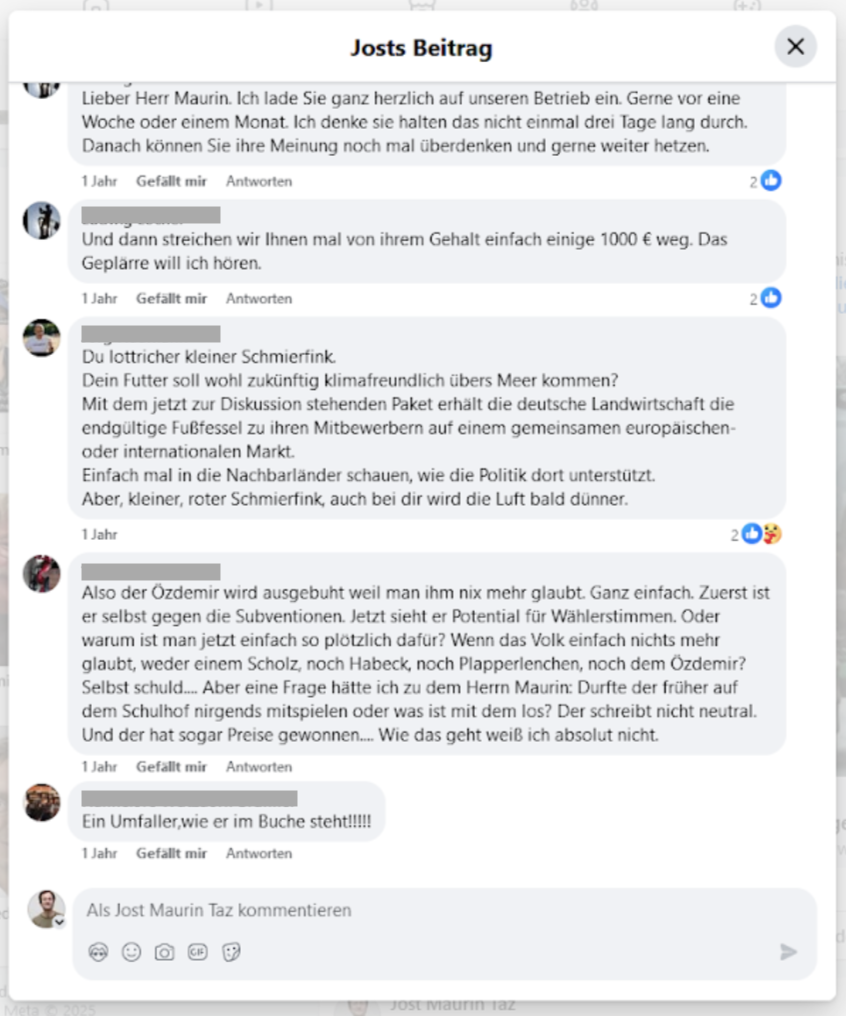
December 2023 – Letter with insults and death wishes
In addition to his report, Maurin also wrote an opinionated commentary on the subsidies for agricultural diesel in the taz newspaper on December 18, 2023 . Maurin says that hardly any farms will give up because they have to pay more for agricultural diesel: Subsidized agriculture must also make its contribution.
Following the commentary, Maurin received a traditional response by post – an anonymous letter addressed to the taz editorial team and dated December 22, 2023. It contained a clear threat.
The content of the letter roughly relates to the discussion about the removal of subsidies for agricultural diesel. Many farmers would not be able to survive without support and tractors with electric drives are not yet available. The sender thinks that Maurin has no idea what he is writing. He begins his letter with the insult “You fucking asshole” and ends much more harshly with a death wish: “You left-wing gallows birds should die!!!”
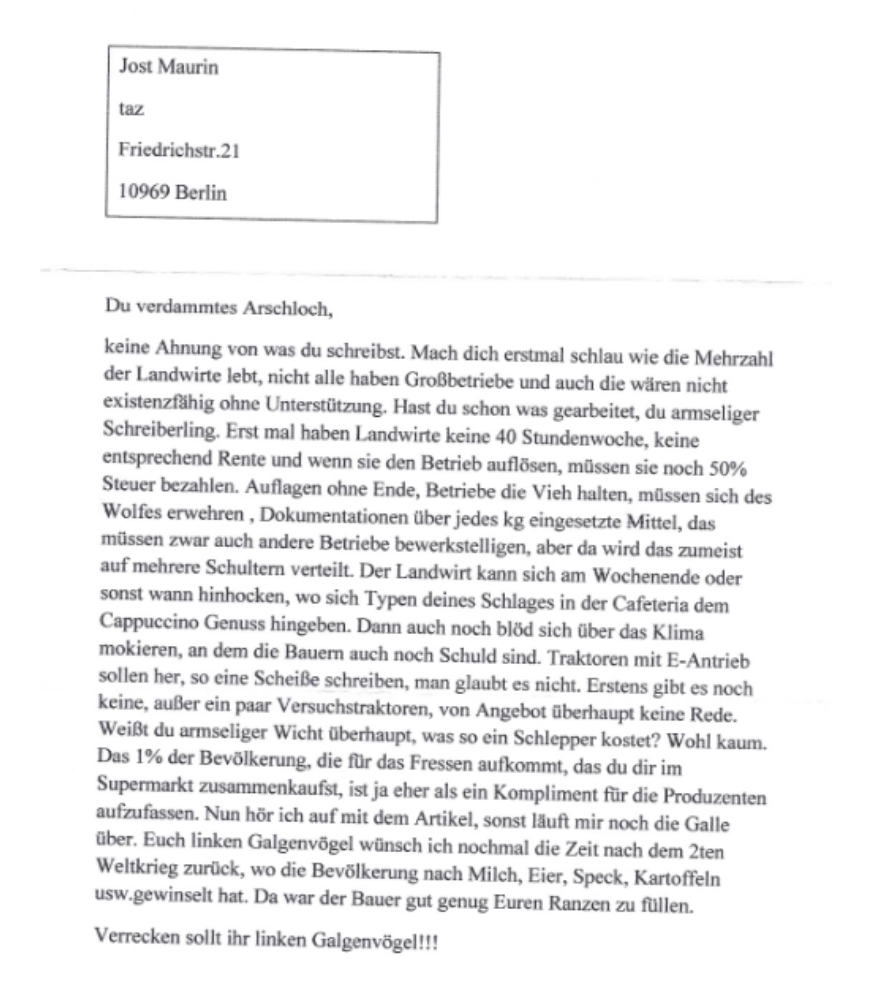
2024 – Maurin now becomes a permanent hate figure
A few days later, on January 4, 2024, there was an action by farmers at a ferry dock in the port of Schlüttsiel in Schleswig-Holstein. Hundreds of people had gathered there, including a convoy of tractors, after it was announced on social media that the then Federal Minister of Economics Robert Habeck (Greens) was on board a ferry heading for the mainland – on his way back from a private vacation. According to police reports, around 25 to 30 people tried to board the ferry at the jetty. A riot broke out and the Minister of Economic Affairs had to turn back.
At the time, the action was one of the high points in the heated atmosphere of the farmers’ protests. And for Jost Maurin, this was also reflected in the social media comment columns.
In a text on January 5, 2024, Maurin on the circumstances of this incident with colleagues from taz, including the author of this report. reports Maurin also shares it on Facebook. There he is called a “smear artist and liar”, someone who cheats and insults and denounces farmers “on purpose”. “You’re simply not worth anything!” one reader wrote to him.
Despite all this, Maurin is not someone who withdraws. He has a strong opinion. Just three days later, on January 8, 2024, he wrote a commentary in the taz with the subline: “The farmers’ protests are inappropriate and encourage right-wing extremists. It’s actually about peanuts – and the prestige of certain farmers’ associations.newspaper ”
The comment is also quoted in other media. “I was one of the first to get to the heart of the matter so critically,” explains Maurin. “Of course, that was diametrically opposed to the arguments of the farmers’ protesters.”
There was a hail of dissenting voices. There are 86 comments in the reader comments section of the newspaper website. Maurin Facebook profilealso feels this . They say he should have a “on his thorough psychological examination”. “Dilettantism”, “Schmiefink”, “scheiß taz Hetzblatt” it goes on.
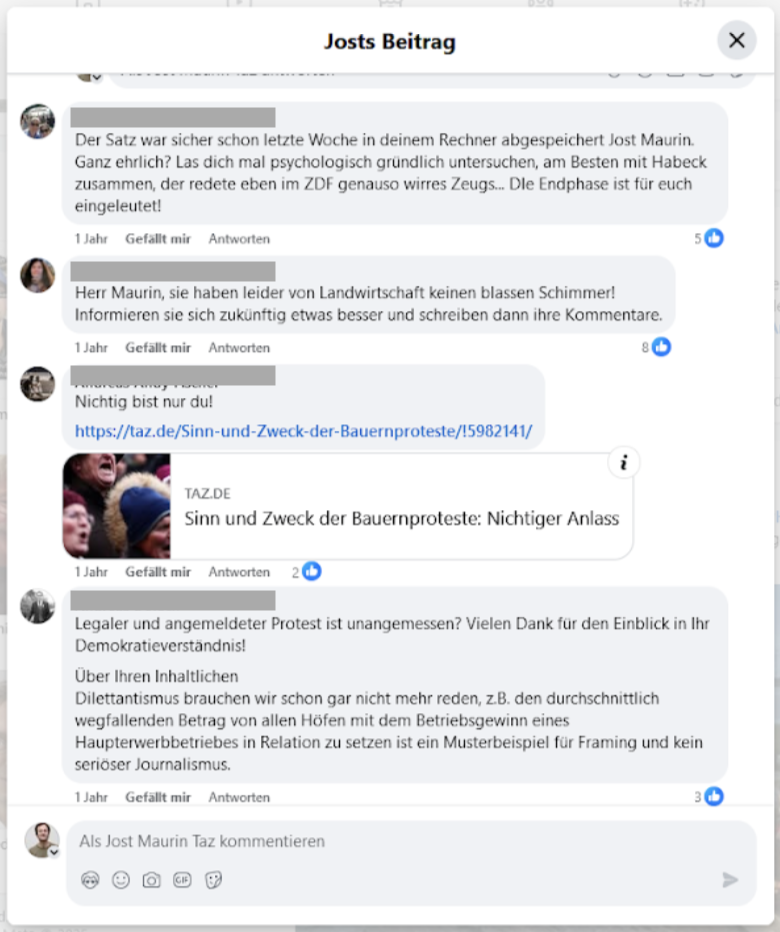
From then on, Maurin’s clear critical stance on their protest was never forgotten by the protesting farmers and their supporters. Since then, they have regularly posted comments on his Facebook posts. He was “a rabble-rouser” and “not a real journalist”, wrote one on , for example26 April 2024. “Such journalists should have their “license” revoked!” said another. He is accused of “farmer bashing” and “hatred of farmers”.
And so it goes on.
He is “not a journalist at all”, incompetent, populist or both, according to posts on July 4, 2024 and in the months that followed. “Hell is waiting for you,” someone wrote to Maurin on September 30, 2024.
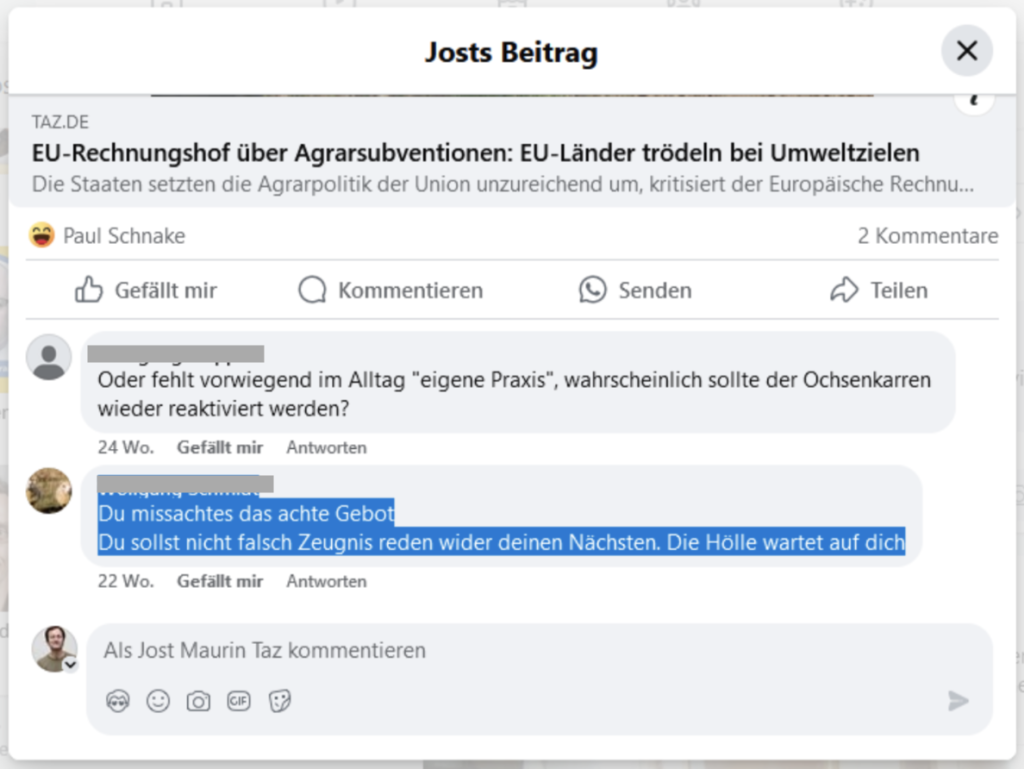
On November 18, 2024, a reader commented under a post that Maurin was engaging in “agitation” and allegedly committing crimes: “Why isn’t this journalist with green leftist leanings stripped of his accreditation as a journalist?” he asked, expressing his support for US President Trump and saying: “Where injustice becomes a right, resistance becomes a duty, as always in the German constitution!!!” Another writes to him, saying he “surpasses the AFD in primitive incitement with contempt for professional groups.”
On December 9, 2024, a Facebook post by Maurin again stated that he was “farmer bashing”. He wanted to “finish off” the farmers and was disgusting and hypocritical.
Such nasty comments are not the worst in themselves and Maurin pretends to be unimpressed, but they have been coming under almost every post for months. They wear you down. All this is still the case in spring 2025, and it’s not getting any more harmless. On February 20, 2025, for example, someone apparently writes under Maurin’s own post under a clear name: “He’s on our list.”
Another reader asks him which list he is referring to and who “us” might be, but receives no answer. The statement that you are on a “list” is probably not legally punishable and it is also difficult to say how seriously it should be taken. But the message gets through. Maurin understands it. He is told that he should be careful.

Personal verbal attacks by farmer leaders
A special case is Maurin’s reporting on Anthony Lee, one of the spokesmen of the farmers’ protests.
In an article from February 12, 2024, Maurin clarifies about Lee, who was also involved in politics as a candidate for the “Free Voters”. According to the article entitled “The demagogue of the farmers’ protests”, Lee, then spokesperson for the Landwirtschaft verbindet Deutschland (LSV Deutschland) association, had attracted attention on several occasions for making false and right-wing populist claims. According to Maurin, Lee declared in mid-January 2024 that politicians wanted to take away farmers’ land in favor of refugees.
Maurin quotes from an interview in which Lee replied to the question “Why are the politicians trying to destroy you?”: “They want our land to build industry, houses… I don’t know… for refugees, whoever. I don’t care for what.” Dutch influencer Eva Vlaardingerbroek published the conversation as a video on Twitter. According to Maurin, Vlaardingerbroek had appeared several times on shows hosted by far-right Donald Trump supporter and conspiracy mystic Tucker Carlson.
Anthony Lee then published a video on YouTube , with the probably partly ironic title: “Die TAZ hat mich überführt-ich gebe auf 😂😂😂😂 niemals ☝️” one day later, on February 13, 2024In just under 9 minutes, Lee goes through Maurin’s article and says: “It’s simply adventurous that this is so-called quality journalism”. At another point, he sarcastically speculates that Maurin is probably doing his job in a “warm armchair” in an “ivory palace in Berlin”, which can be taken to mean that Maurin has no idea as a journalist. In the video, Lee repeats the claim that one of the many reasons why agricultural land is needed could be houses for refugees. He repeatedly addresses Maurin personally and at one point says “you idiot”.
The video went viral. It has over 100,000 views on YouTube, including over 1,000 comments. These are quite something. “Such ‘journalists’ shouldn’t even get a loaf of bread at the bakery!!!” writes one user in reference to Maurin’s video. One comment reads “The press is completely insane”, another describes journalists as “smear merchants”, while another speculates that they receive bribes from the government.
Months later, on December 3, 2024, Maurin reports again on Anthony Lee. In the meantime, he had left the “Free Voters” association. According to the party, it had previously initiated a disciplinary procedure because Lee had spoken at a demonstration in Bielefeld on November 8, 2024, promoting a coalition between the CDU and the extreme right-wing AfD. Several “problematic” organizations, including “Querdenken”, are said to have invited people to the event, a representative of the “Freie Wähler” party told taz. Lee himself admitted the facts in a YouTube video at the end of November 2024. He had not known who had organized the demonstration.
On the same day as the taz article, Anthony Lee uploaded another YouTube video on December 3, 2024, in which he berated Maurin’s report. The video receives over 80,000 views in total.
In the video, Lee once again addresses Maurin personally in front of his audience, quoting from his publicly filed biography and making fun of him. In parts of the video, Lee again confirms the accusations made against him: For example, he makes it clear about the so-called “lateral thinking” scene of vaccination opponents and critics of measures during the corona pandemic that he does not consider it problematic. He was accused of being close to them.
In the course of the video, Lee also addresses the agricultural sociologist Janna Luisa Pieper from the University of Göttingen. Pieper had also publicly criticized in an interview on NDR on 7 February 2024 and was met with massive hostilityLee and other farmers’ associations for his right-wing political stance . Several people had also tried to take legal action against Pieper. Among them Lee.
However, according to the specialist portal “Land & Forst”, several courts ruled that there was sufficient evidence for Pieper’s statements. She is therefore allowed to describe the organizations “Freie Bauern” and “Land schafft Verbindung” (LsV) Schleswig-Holstein and Hamburg as “right-wing populist” and Anthony Lee as someone who has “attracted attention through right-wing extremist to right-wing populist statements”.
Lee now says on December 3, 2024, referring back to the case and – probably in reference to both her and taz editor Maurin: “I don’t give a shit what you do, you scumbags.”
Lee received over 500 comments under the video. Most of them agree with him and express their support for him. However, some of the viewers go further and add to the hostility towards Maurin. The comments talk about “regime media” and “lying press” and, with regard to Maurin himself, that he is “crazy”, a “hack” and a “liar”. One wrote: “Such ‘agents’ are opinion makers in Germany – a disgrace”. Another says: “You just have to make fun of all this garbage from the so-called journalists.”
Although Maurin works for a newspaper organized as a cooperative, a reference is made to the public media, which are particularly hated in the right-wing milieu: “People like that and our public broadcasters belong gone immediately”. Some of the comments also sound like a threat. At one point, for example, it says: “I could have thought of something about the two ‘journalist’ birds and some cow dung. Yes, I know, you don’t do that, but doesn’t it sometimes itch?” Elsewhere, it is suggested that you can also visit Maurin (here incorrectly as “Laurin”) in person: “Just stay with Laurin and his paper, then the problems are solved!”
Lee insulted Maurin in a video on last May 18, 2025. Three days earlier, Maurin had written a commentary about the EU Commission wanting to weaken the protection of meadows and pastures. Maurin said that when farmers turn grassland into arable land, CO₂ emissions increase.
Antony Lee then spoke in a “weekly review” with another activist from the farmers’ protest movement, potato farmer Christian Beißner. After almost 40 minutes, they talk about Maurin’s comment. Lee says about Maurin: “Look at him. He’s sitting in some fucked-up office in Berlin with his Jesus shoes on, eating his bag of potato chips – I’d like to look in his fridge – and writing some shit he has no idea about. He’s never worked a day in his life.”
While his interviewer Beißner reads out Maurin’s comment, Antony Lee points two fingers at the camera. He had addressed Maurin directly by name a few minutes earlier and it is clear from the context that this insulting gesture is directed at Maurin. He later calls Maurin a “stupid man”, and at another point an “ass”. Beißner also insults Maurin, calling him “weirdo”, “moron” and “coyote” during the video.
Maurin explained that he had reported the statements in the video to the police for insulting him.
Neither Christian Beißner nor Antony Lee responded to an inquiry for this report. Instead, Lee published a video together with his lawyer in response to the inquiry. The title of the video includes the sentence: “TAZ is trying to silence us”. It had over 130,000 views on YouTube by the end of June 2025.
In the video, Lee admitted to calling a taz journalist an “ass”. “I said that, I make no secret of it. But my point is that my professional colleagues are insulted on a daily basis because of completely misguided and incorrect information or press work – including and especially by taz – people, families, in everyday life. Children have to put up with things: They are ‘animal abusers’, ‘climate polluters’, ‘drinking water polluters’ and and and – due to completely false reporting.” Lee went on to say in the video: “It’s not just a feud between the journalist and me. The journalist is harming over 200,000 families and their children with reporting that is completely false.”
Lee’s lawyer explained in the same video that Lee and his family were equally victimized. “You suddenly become the target of some attacks by journalists who are at their desks and concoct some ideas. At some point, that’s the limit.”
In response to the accusation that Lee’s statements encourage commentators under his videos to make further hate posts against Jost Maurin and other members of the press, Lee explained in the video: “I have extra filter functions set so that people don’t mention certain keywords. I delete everything I see immediately if it violates the constitution. When it comes to insults, definitely. What I find offensive, anyway. But that’s all I can do as a Youtuber. I can’t go through everything every day.”
In the video, Lee and his lawyer discuss not only the request for this report but also the complaint that Jost Maurin filed. Lee’s lawyer explained in the video, among other things: “There’s always been the phrase, ‘The greasers from such and such a paper’. I am not aware of a single judgment where this would have passed as an insult. On the contrary: journalists should normally feel that their honor has been touched at this point and say: ‘Man, we’re rubbing each other the wrong way. I don’t agree with him and he obviously doesn’t agree with me. And we’ll deal with that professionally and continue to rub shoulders. But taking legal action now and terrorizing the public prosecutor’s office is not only the wrong way to go about it, I also think it’s a cowardly way. It’s cowardly.”
Elsewhere, Lee’s lawyer addressed journalists and advised them to be careful and not to give the impression that Lee was a right-wing extremist. Lee himself explained elsewhere: “I am no longer in any party”. He mentions every party when it does something good. Lee also mentioned the Greens and the Left.
No end in sight
For Maurin, the hatred continues to this day: threats under YouTube videos, legal complaints, letters, home visits and, to this day, disparaging comments under almost every post he publishes on his private Facebook profile on the subject of agricultural policy and farming. The fact that he is losing his inhibitions can also be seen in how many of the insults are openly posted under his real name.
He used to reply, but has since become jaded, says Maurin. “I don’t usually read most of the comments.”
Narratives and network analysis
“Regime media”, “lying press”, “dilettante”, “agent” – numerous recurring narratives can be derived from the accusations made against journalist Jost Maurin.
It recalls the accusations of allegedly not being an objective journalist at all, of not reporting neutrally, but of being an activist or propagandist. “That’s the standard accusation,” says Maurin. “What is meant, of course, is that the reporting is bad for the farmers. The accusation is completely subjective.” Another accusation is that he only writes what serves his bubble in order to generate clicks. Years ago, it was even said more explicitly that he only wanted to make money with his arguments. “Then at some point I wrote about what a taz editor earns. After that, the argument never came up again,” says Maurin.
Analysis of an exemplary network
To take a closer look at the general debate among farmers and agriculturalists, it is worth taking a look at the chat groups and comment columns on social media. Which discourses are intermingled? What is the political mood? What is the relationship with the press? And what narratives are being used?
Farmers and agriculturalists in Germany mainly communicate via the messenger service Whatsapp, which technically limits groups to a maximum size of 1,024 members. These were also used to organize past waves of protest. As these are closed groups, it is difficult to carry out a broad-based analysis using standard tools. Nevertheless, channels on other platforms, such as Telegram and Gettr, are known to also deal with agricultural issues and where the farmers’ protests were also discussed and in some cases called for.
An analysis of the narratives that emerge in social media in connection with the farmers’ protests and in relation to the relationship with the press cannot therefore be comprehensive or representative, but can only provide a limited insight. Analyses are also limited by the quantitative boundaries of the analysis tools, which do not have interfaces to all platforms and whose ability to process content and record channels is technically finite. A bias in the data basis – in this case the selection of platforms and channels – must also be taken into account.
Nevertheless, a number of recurring ideological patterns can be identified across the platforms.
The analysis platform “Juno” from Gerulata Technologies and the analysis tool “Open Measures” were used for this report. Among other things, we used the ChatGPT 4o large language model from OpenAI to evaluate the content of the large amount of data.
We proceeded in three steps, narrowing the field of vision more and more: First, we chose an approach that took a broader approach based on the data in the tools used and was intended to shed light on the topics with which the discussion about farmers and agriculture is linked. In a second step, we examined the narratives in a specific bubble of channels that we were already familiar with for their role in the context of past farmers’ protests. In a third step, we focused on the narratives that specifically revolved around the taz editor Jost Maurin.
First step: The broader picture
In order to shed light on the broader cluster of topics linked to the discussion about agriculture on social media, we initially selected four hashtags for analysis, from which we built a broader network. We decided on the hashtags: “agriculture”, “farmers”, “farmer protests” and “lying press”. In the order listed here, the meaning of the hashtags increases in their political implications, with “agriculture” being the most politically neutral word and “lying press” the most politically charged. “Lügenpresse” functions as an emotionally charged term to reject traditional media and is typically used in conspiracy ideology and right-wing populist circles.
Based on these four hashtags, we added the 100 most strongly connected hashtags and the 100 most strongly connected users and channels – initially separately for each individual hashtag. We then drew relationships between all hashtags and users/channels. The questions that guided us based on this network graph included What do the listed hashtags, which are related to the relatively neutral terms “agriculture” and “farmers”, say about the political orientation of the bubble under investigation that uses these hashtags? What narratives does this bubble serve? How strong are the links between the hashtags “farmers” and “agriculturists” and the hashtags “farmer protests” and “lying press” and what does this say about the image of the press?
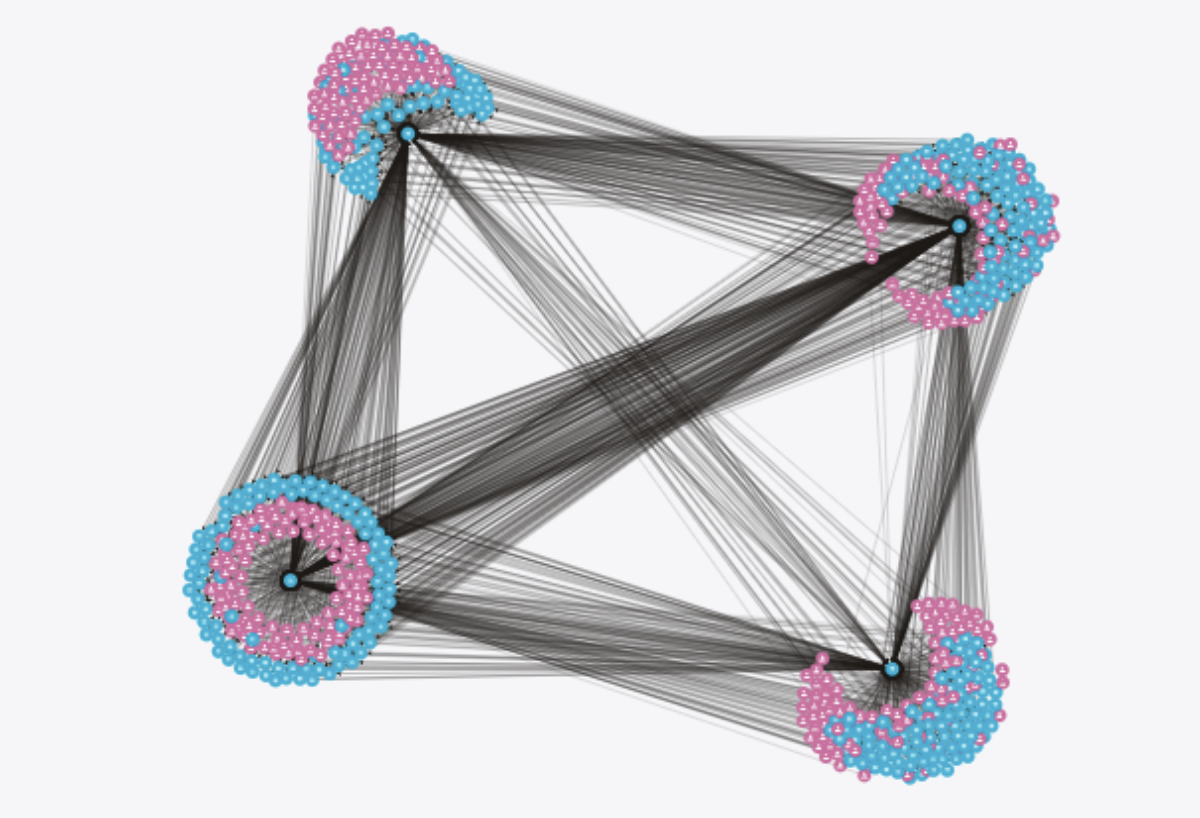
A total of 363 hashtags and 365 users or channels were included in the study. The number deviates from the theoretical total of 800 nodes (100 connected users and 100 connected hashtags per initial hashtag), as there were already overlaps and thus duplications in this first step.
Due to the data basis of the tool, this analysis includes users of Telegram, Gab, Truth Social, VK and, above all, Gettr. The social network “Gettr” is popular with populists, right-wing extremists and conspiracy ideologues. Gettr was founded on July 4, 2021 by a former advisor to Donald Trump, also as a counter-movement to an alleged “deletion culture” and “censorship” on other platforms. According to its own information, the network had around 3 million users worldwide at the end of 2021, including probably 250,000 in Germany. This selection of accounts must be taken into account as a bias in the analysis.
The narratives surrounding the relatively neutral hashtags “agriculture” and “farmers” already indicated a political tone: Associated hashtags such as “Soros”, “Die Basis”, “Systemmedien”, “Werteunion” or “Flüchtlingspolitik” show a proximity to conspiracy ideology, right-wing populist or system-critical discourses.
The reference to the billionaire and philanthropist George Soros, for example, is a well-known and often antisemitic narrative that insinuates Soros’ influence on (geo)politics. The “Basis”, on the other hand, is a conspiracy ideology right-wing party that was founded in the wake of protests by anti-vaccination activists during the coronavirus pandemic. The word “system media” stands for a fundamental opposition to and mistrust of traditional media. “Werteunion” is a new micro-party that is politically far to the right and the keyword “Flüchtlingspolitik” (refugee policy) suggests an anti-migration stance in this context.
Although “farmers” and “agriculture” initially appear neutral as terms, the surrounding hashtags are highly politicized, at least based on the data available here. They show a clear overlap with right-wing populist narratives. The bubble examined is characterized by a mistrust of politics and the media.
Between the four initial keywords, however, the hashtags “farmers” and “farmer protests” have the most connections, with over 600 links in total. The terms are linked in terms of content in our bubble – the protest perspective is a central component of the discussion.
There is also a strong overlap with the strongly anti-press keyword “lying press” in the network examined. For example, in 178 cases, the hashtag “lying press” was also associated with the keyword “farmer protests”. As a result, the agricultural policy protest is linked to narratives critical of the government and the media in the network examined.
Second step: Investigation of a network of known channels
Following this initially broader approach, we took a look at an exemplary network in a second step. Among other things, we started with German telegram channels that were known have toplayed a role in the farmers’ protests of 2024. Some of the channels used in this investigation have tens of thousands of subscribers.
These included the channel “Land schafft Verbindung” with 1,000 subscribers, the channel “Bauern Verbraucher geeint” with 20,300 subscribers, “Arminius Erben” with 32,000 subscribers, but also regional channels such as “Freie Schleswigholsteiner” with 5,700 subscribers.
From here, we expanded the network to include connected social media channels, users and hashtags, to a total of 286 topic-specific nodes, which had 2,814 connections between them. The most important platforms in this second analysis were Telegram, VK and Gettr.
One of the users who played a role in this analysis, for example, is “Linux_Milk” with around 3,500 followers on the Gettr platform. “Linux_Milk” shares on his public profilecontent from German Holocaust denier Ursula Haverbeck , among other things, and statements in his profile picture already suggest a proximity to the far-right Reichsbürger ideology, in which he declares that the Federal Republic of Germany is “occupied” and a “state simulation”.
Agricultural and protest topics and hostility towards supposed elites
Many of the hashtags used in the exemplary network we investigated are confrontational and emotionalizing. This is typical of communicative spaces in which echo chambers and polarization tendencies have become entrenched.
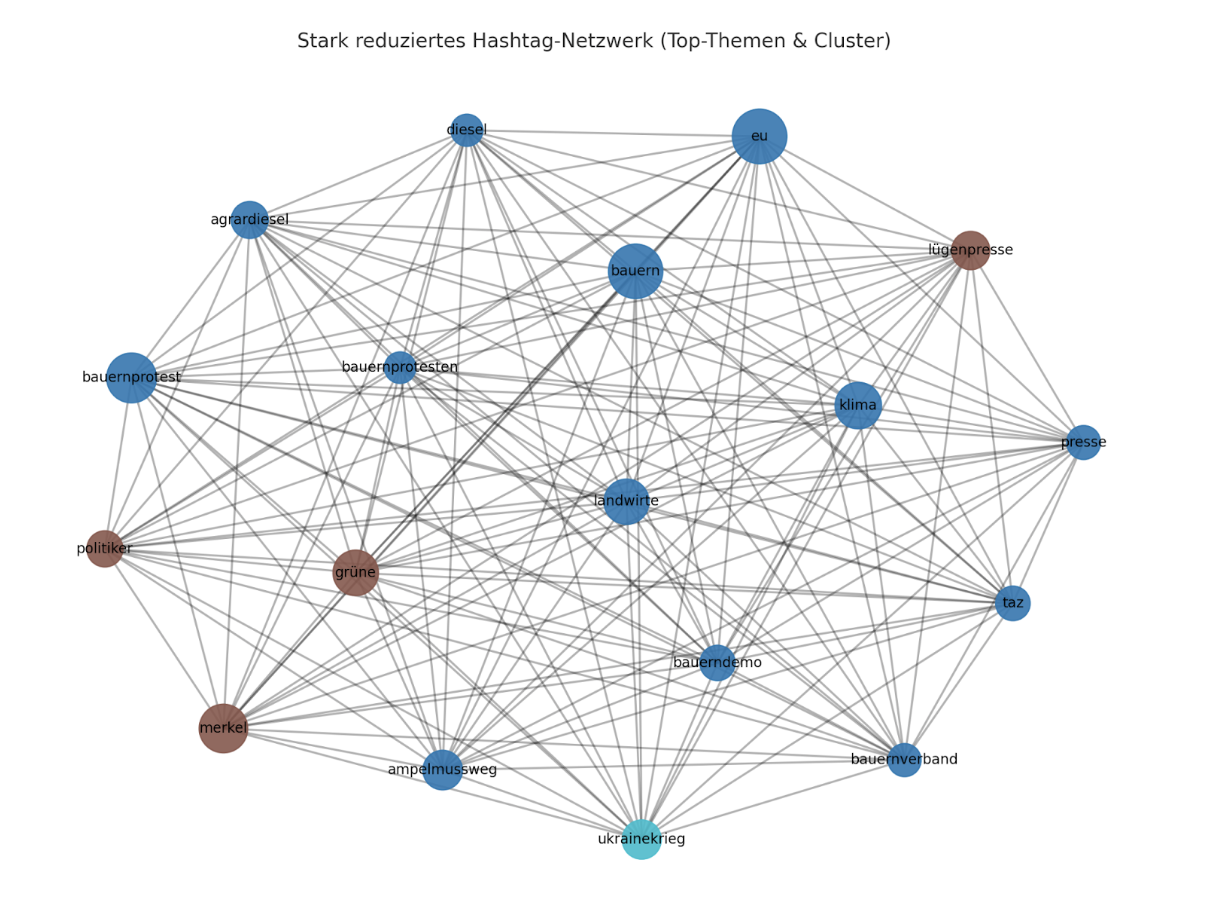
The most important topic that was mentioned the most across the various platforms in this network was “#farmersprotest”. Among the ten most frequently mentioned hashtags, however, was once again the anti-press signal word “lying press”. The other relations to hashtags related to the press also reveal a partly conspiracy-theory discourse that portrays the traditional media as manipulative or untrustworthy. The hashtag “taz”, which refers to the daily newspaper “taz”, also appears more frequently. It is mentioned in a negative context with other anti-press terms.
Overall, the ten most frequently mentioned hashtags in our sample can be divided into two groups of topics, although they do not appear separately but are interwoven in terms of content:
On the one hand, the content of posts with hashtags such as #farmersprotest, #farmers, #farmers and #climate revolved around agricultural, environmental and protest topics.
A second topic cluster can be formed with the hashtags #Lügenpresse, #Merkel, #Grüne, #EU and #Ampelmussweg. It summarizes a criticism of politics and the media that escalates into hatred of supposed elites and conspiracy thinking. These terms are all familiar from earlier right-wing populist protest movements in Germany and Europe and reflect a skeptical to hostile relationship with established parties, institutions and the press.
The hashtag “Greens” refers to the ecologically oriented party “The Greens”, which governed Germany from 2021 to 2025 in the so-called “traffic light coalition” with the liberal FDP and social democratic SPD. The hashtag “Merkel” refers to the long-standing German Chancellor Angela Merkel (CDU). In combination with other topics, hashtags such as “#refugee policy” or “#Ukraine war” also indicate a politically right-wing tendency in the network we analyzed.
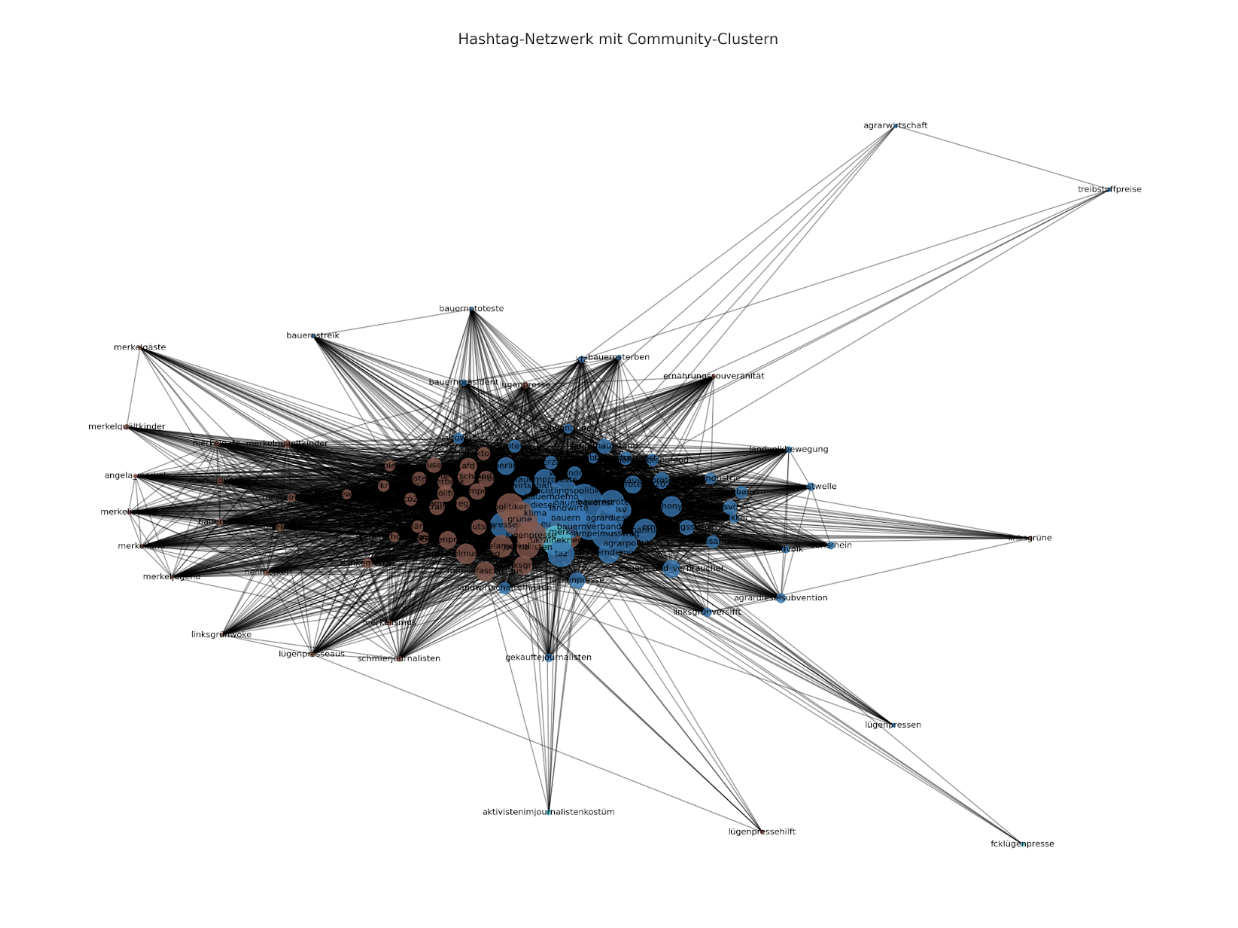
In this respect, the network analysis also shows a clear right-wing ideological profile in the second social media bubble examined. The thematic structure, as reflected in hashtag usage, reveals a highly polarized communication culture. The protest stance against the traffic light government forms the center of the narrative. Farmers’ economic concerns are intertwined with ideological rejection of democratic institutions.
The relatively high presence of the hashtag #Lügenpresse (lying press) takes on the character of a general delegitimization of the press. The media are not only criticized, but also seen as part of an opposing political system.
Third step: taz editor Jost Maurin as a target
In the analysis of the exemplary network, the frequent reference to the “taz” is symbolically charged: Within this bubble, it does not stand for specific reporting, but rather for an entire milieu – a supposedly “left-liberal”, “urban” or “green” media landscape. It functions as a bogeyman. The focus is particularly on taz editor Jost Maurin.
In a third step, we therefore examined those social media posts that referred to Maurin in particular. Using the “Juno” tool from Gerulata Technologies and the “Open Measures” tool, we searched well-known and less well-known platforms – from Bluesky to Twitter, Telegram, Gettr, Parler, Gab, Truth Social, TikTok, Mastodon, VK, 4Chan and others – for mentions of Maurin since 2017, provided they were related to the relevant topics such as agriculture, the environment, climate, farmers’ protests and the like.
We found around 150 posts about Jost Maurin in the content collected by the tools. This clearly shows that as soon as he addresses right-wing populist or right-wing extremist tendencies in agriculture or the farmers’ protest movement, his journalistic work is seen as an attack.
The ensuing verbal counterattacks follow recurring patterns that can also be observed against other journalists who are defamed for their reporting. For example, Maurin is accused of pursuing a political agenda and activism instead of objective reporting – an accusation that is usually linked to the Greens or climate protection. Particularly in the circles of protesting farmers, he is seen as someone who puts them “in the right corner” and reports in a biased way. Maurin is accused of defamation or slander. More radical users see him as part of a supposed system press and call him, for example, a “court reporter in line”.
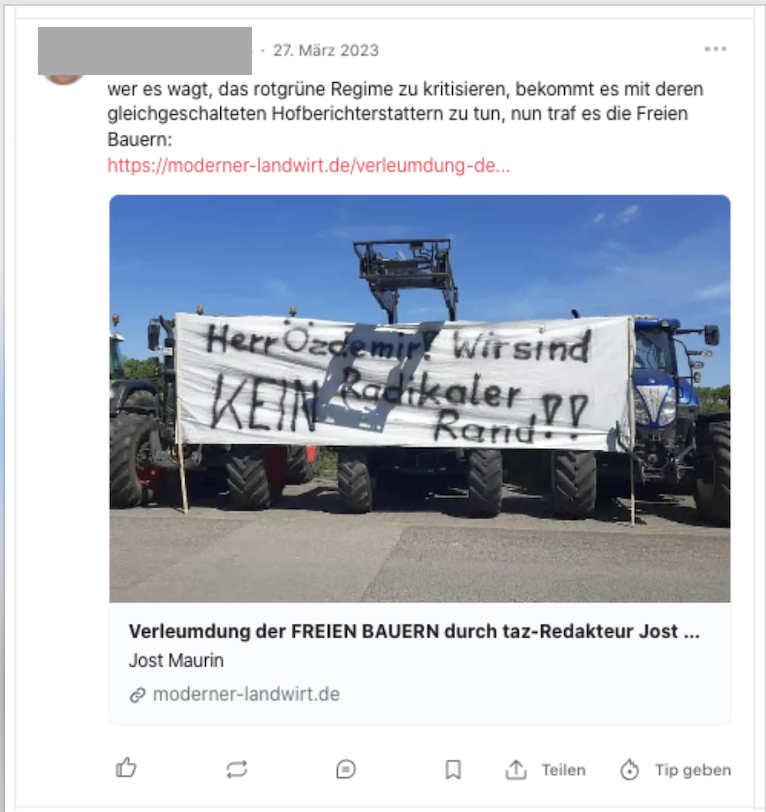
In a post on Twitter on October 24, 2024, Maurin is even compared to the Nazi war criminal Reichsmarschall Hermann Göring. On the occasion of a lamented rise in butter prices, Maurin had argued that the consumption of margarine was better for the environment and livestock anyway. A screenshot of Maurin’s comment was juxtaposed in the post with a picture including swastikas and a quote from Göring, in which the Nazi politician said that butter made the people fat. In response to the rhetorical question in the post “Find the mistake”, one user replies: “There is none”.
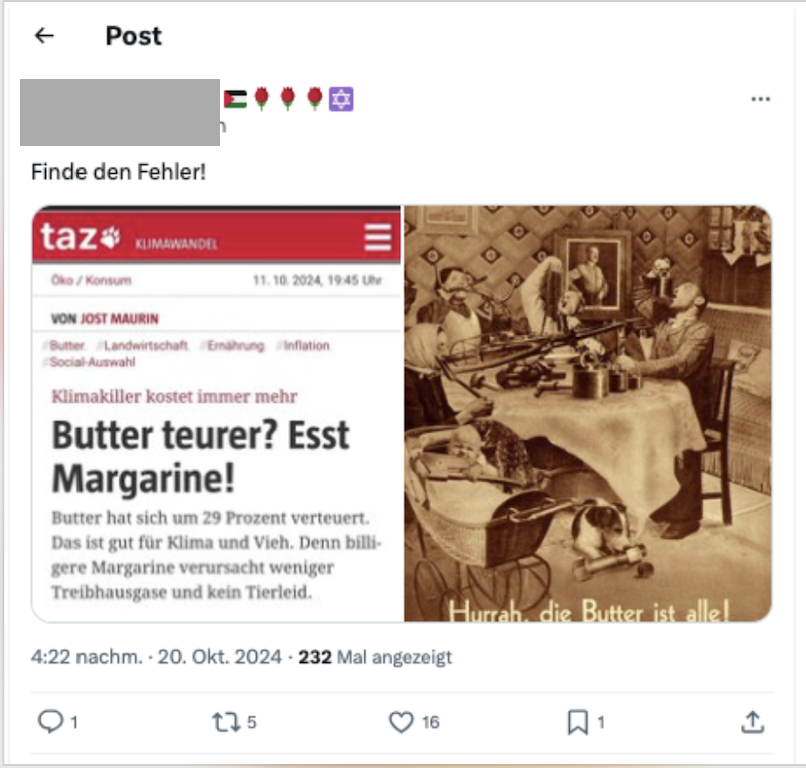
The posts about Maurin also show a clear differentiation according to channel. The criticism on Gettr and in Telegram channels is particularly radical and defamatory. Bluesky, on the other hand, is dominated by a mockingly ironic tone. There, Maurin is attacked less head-on, but his credibility is called into question – for example with references to alleged hypocrisy and elitist attitudes by preaching about the climate crisis but vacationing in the Seychelles – which, according to Maurin, is of course not true. On Mastodon, on the other hand, Maurin’s work is predominantly received positively – as careful research and differentiated analysis.

